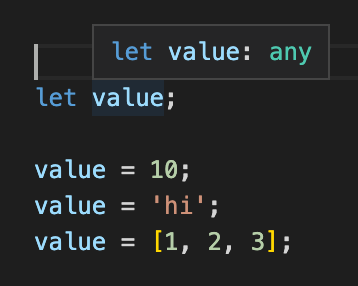Using types
Dip your toes into using types with TypeScript by learning about the core types offered by the language, and how to define variables and functions with them.
In the previous lesson, we got a rough idea of how types are used by utilizing the number type in a function's parameters. The number type is one of TypeScript's three core types.
Core types
| Name | Example | Description |
|---|---|---|
number | 1, 5.3, -10 | All numbers. No differentiation between integers and floats. |
string | 'hi', "hello world" | All text values. |
boolean | true, false | Just these two. No "truthy" or "falsy" values. |
With variables
Just because we're writing TS files doesn't mean we need to explicitly define the type of every single value/parameter though. We'll create a new file called using-types.ts and create a basic variable:
const value = 10;
When hovering over the variable, we see that TypeScript was smart enough to infer that the data type stored in value should always be a number.

Attempting to reassign value to a type other than a number will result in a compiler error.
But what if we want to declare the variable with no initial value, and then change it later?
let value;
value = 10;
TypeScript can't automatically infer the type of the variable when we don't provide it an initial value, so it automatically uses the any type.
Note: Avoid using the
anytype as much as possible. It completely defeats the purpose of using TypeScript in the first place, as it removes the benefits of TS.
Because of this, we can set value to be absolutely anything without receiving any compiler errors.

To resolve this, we can annotate the variable by adding a colon (:) after the name followed by the name of the type we'd like to be tied to the variable.
let value: number;
// Totally ok
value = 10;
// This will throw a compiler error
value = 'hello academy!';
To allow for the value variable to hold multiple different types, we can use a union type. It works just the same way as the or (||) operator in JavaScript, but only uses one pipe (|) character and only works with types and type annotations.
// "value" can hold either a number or a string
let value: number | string;
// Totally ok
value = 10;
// Totally ok
value = 'hello academy!';
// This will throw a compiler error, because we didn't include
// number arrays in our union type.
value = [1, 2, 3];
Later in this course, we'll be getting more into union types.
With functions
With functions, you can define the types of both the parameters and the return type. Here's a basic function:
const totalLengthIsGreaterThan10 = (string1, string2) => {
// Returns true if the total length of both strings is greater
// than 10, and false if it's less than 10.
return (string1 + string2).length > 10;
};
Just like with the parameters in the function from the last lesson, and similar to variables, these parameters can be annotated with a colon (:) and a type name. In this case, we are expecting two strings into this function.
const totalLengthIsGreaterThan10 = (string1: string, string2: string) => {
return (string1 + string2).length > 10;
};
The return value of this function is a boolean, which TypeScript has intelligently inferred.

Despite the correct inference, if we wanted to explicitly annotate this function's return type, we could. Return type annotations go after the parentheses (()) where the function's parameters are defined.
const totalLengthIsGreaterThan10 = (string1: string, string2: string): boolean => {
return (string1 + string2).length > 10;
};
For non-arrow functions, the type annotation syntax is the exact same:
function totalLengthIsGreaterThan10(string1: string, string2: string): boolean {
return (string1 + string2).length > 10;
}
Next up
Next up, we'll discuss a few more basic types supported in TypeScript and how to use them.